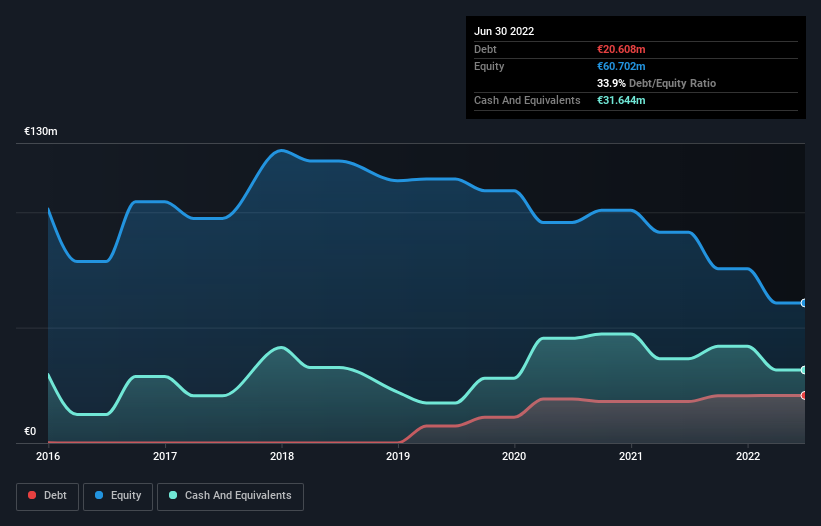Nicox (EPA:COX) Has Debt But No Earnings; Should You Worry?

Warren Buffett famously said, 'Volatility is far from synonymous with risk.' It's only natural to consider a company's balance sheet when you examine how risky it is, since debt is often involved when a business collapses. As with many other companies Nicox S.A. (EPA:COX) makes use of debt. But the more important question is: how much risk is that debt creating?
Why Does Debt Bring Risk?
Debt and other liabilities become risky for a business when it cannot easily fulfill those obligations, either with free cash flow or by raising capital at an attractive price. If things get really bad, the lenders can take control of the business. However, a more frequent (but still costly) occurrence is where a company must issue shares at bargain-basement prices, permanently diluting shareholders, just to shore up its balance sheet. Of course, debt can be an important tool in businesses, particularly capital heavy businesses. When we examine debt levels, we first consider both cash and debt levels, together.
View our latest analysis for Nicox
How Much Debt Does Nicox Carry?
You can click the graphic below for the historical numbers, but it shows that as of June 2022 Nicox had €20.6m of debt, an increase on €18.0m, over one year. However, it does have €31.6m in cash offsetting this, leading to net cash of €11.0m.

How Healthy Is Nicox's Balance Sheet?
The latest balance sheet data shows that Nicox had liabilities of €9.69m due within a year, and liabilities of €28.8m falling due after that. On the other hand, it had cash of €31.6m and €3.25m worth of receivables due within a year. So it has liabilities totalling €3.64m more than its cash and near-term receivables, combined.
Since publicly traded Nicox shares are worth a total of €73.9m, it seems unlikely that this level of liabilities would be a major threat. However, we do think it is worth keeping an eye on its balance sheet strength, as it may change over time. Despite its noteworthy liabilities, Nicox boasts net cash, so it's fair to say it does not have a heavy debt load! The balance sheet is clearly the area to focus on when you are analysing debt. But it is future earnings, more than anything, that will determine Nicox's ability to maintain a healthy balance sheet going forward. So if you're focused on the future you can check out this free report showing analyst profit forecasts.
Over 12 months, Nicox made a loss at the EBIT level, and saw its revenue drop to €7.3m, which is a fall of 38%. To be frank that doesn't bode well.
So How Risky Is Nicox?
We have no doubt that loss making companies are, in general, riskier than profitable ones. And the fact is that over the last twelve months Nicox lost money at the earnings before interest and tax (EBIT) line. And over the same period it saw negative free cash outflow of €19m and booked a €49m accounting loss. But at least it has €11.0m on the balance sheet to spend on growth, near-term. Overall, we'd say the stock is a bit risky, and we're usually very cautious until we see positive free cash flow. The balance sheet is clearly the area to focus on when you are analysing debt. But ultimately, every company can contain risks that exist outside of the balance sheet. Case in point: We've spotted 3 warning signs for Nicox you should be aware of.
If, after all that, you're more interested in a fast growing company with a rock-solid balance sheet, then check out our list of net cash growth stocks without delay.
Valuation is complex, but we're here to simplify it.
Discover if Nicox might be undervalued or overvalued with our detailed analysis, featuring fair value estimates, potential risks, dividends, insider trades, and its financial condition.
Access Free AnalysisHave feedback on this article? Concerned about the content? Get in touch with us directly. Alternatively, email editorial-team (at) simplywallst.com.
This article by Simply Wall St is general in nature. We provide commentary based on historical data and analyst forecasts only using an unbiased methodology and our articles are not intended to be financial advice. It does not constitute a recommendation to buy or sell any stock, and does not take account of your objectives, or your financial situation. We aim to bring you long-term focused analysis driven by fundamental data. Note that our analysis may not factor in the latest price-sensitive company announcements or qualitative material. Simply Wall St has no position in any stocks mentioned.
About ENXTPA:ALCOX
Nicox
Operates as an ophthalmology company in France and internationally.
Slight with concerning outlook.

